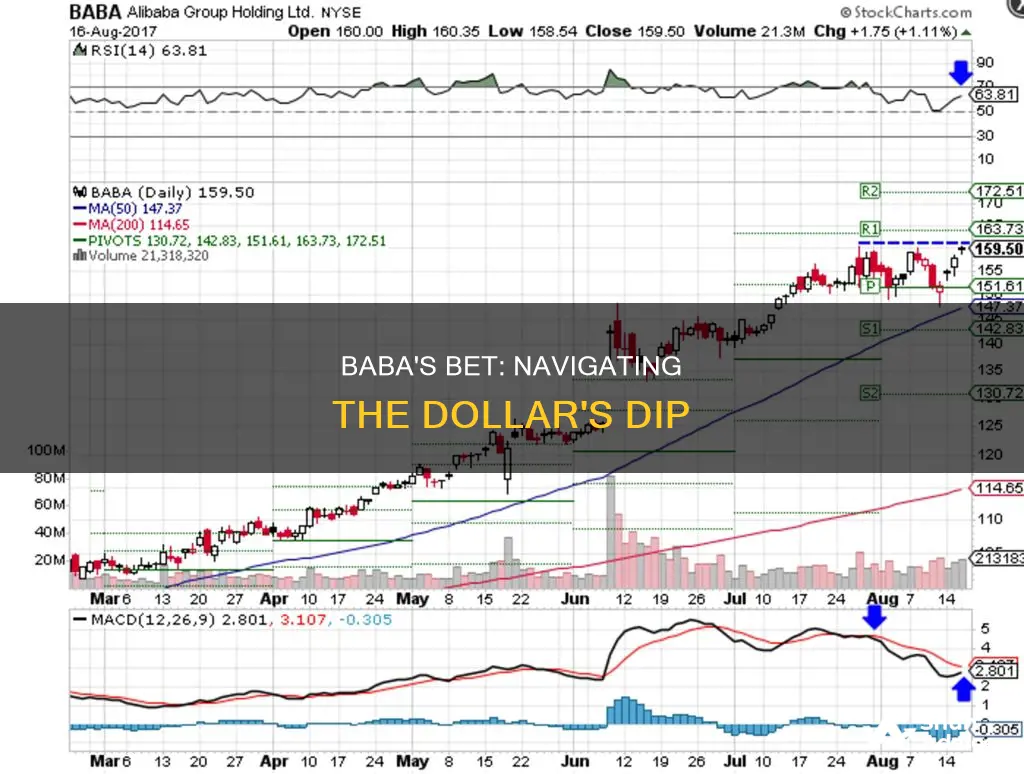
The US dollar has been gradually weakening since 2020, with its value relative to other world currencies declining. This depreciation accelerated in 2022 due to rising inflation, impacting both domestic and international investments. A weak dollar can signal an economic downturn, rising inflation, or both.
Alibaba Group Holding Limited (BABA) is a Chinese company that has experienced significant losses in recent years due to geopolitical and macroeconomic headwinds. Despite this, BABA remains an attractive investment opportunity for some, trading at a low valuation compared to US big tech companies.
The impact of a weakening US dollar on BABA is unclear. On the one hand, a weaker dollar could make BABA's goods and services more affordable to international buyers, potentially increasing their total trade and benefiting the company. On the other hand, a weaker dollar could make it less competitive in the US market, as the price of its products in euros or other currencies would be higher, leading to lower sales as foreign buyers shift to lower-cost alternatives.
Therefore, whether a weakening US dollar will make BABA a worse investment is a complex question and depends on various factors, including the company's ability to adjust to changing market conditions and the actions of central banks and governments.
What You'll Learn

Impact on BABA's revenue and profit margins
Alibaba (BABA) is a Chinese company that reports its financials in RMB. As of January 2024, BABA had $33.38 billion in cash on hand and $45.29 billion in short-term investments, for a total of $78.67 billion in liquidity. They also held $62.47 billion in long-term investments, bringing their total assets to $248.13 billion. On the liabilities side, BABA had $87.87 billion in total liabilities, with $21.71 billion in long-term debt.
In the trailing twelve months (TTM), BABA generated $125.31 billion in revenue, $47.28 billion in gross profit, $18.17 billion in net income, and $24.51 billion in free cash flow (FCF). This equates to a 37.73% gross profit margin, a 14.5% profit margin, and a 19.56% FCF yield.
BABA is trading at 7.75x its FCF, meaning that if all its shares were acquired, it would pay back 100% of the investment in less than 8 years. This is one of the lowest valuations for a company of its size and is more akin to a tobacco company than a tech company. BABA also trades at 7.53x 2024 earnings and 6.72x 2025 earnings, while the cheapest of US big tech trades for 19.95x 2024 earnings and 17.51x 2025 earnings.
A weaker US dollar could positively impact BABA's revenue and profit margins. As a Chinese company, BABA's financials are reported in RMB, which is pegged to the US dollar. When the dollar weakens, the RMB also weakens, making Chinese exports more competitive on the global market. This could lead to increased revenue for BABA, as their goods and services become more affordable for international buyers.
Additionally, a weaker RMB would result in higher profits when converted back to US dollars. This is because a weaker dollar means that more dollars are needed to purchase the same amount of RMB. This would especially benefit BABA, as they generate a significant portion of their revenue abroad.
However, it is important to note that a weakening RMB could also have negative consequences for BABA. A weaker RMB would increase the cost of importing goods and services from overseas, potentially impacting their profit margins. Additionally, a significant devaluation of the RMB could lead to capital outflows as investors seek safer assets, causing further depreciation of the currency.
In conclusion, while a weaker US dollar could positively impact BABA's revenue and profit margins in the short term, it is important to consider the potential negative consequences, particularly if the RMB weakens significantly.
VP Investments: Milwaukee's Hotspots for Financial Opportunities
You may want to see also

BABA's financial health and ability to withstand losses
Alibaba Group Holding Limited (BABA) has a market cap of US$201.2 billion. The company has a total shareholder equity of CN¥1,112.6 billion and total debt of CN¥170.8 billion, giving it a debt-to-equity ratio of 15.3%. BABA's short-term assets (CN¥752.9 billion) exceed its short-term liabilities (CN¥421.5 billion) and its long-term liabilities (CN¥230.7 billion). The company's debt is well covered by its operating cash flow (106.9%) and its interest payments are covered by its EBIT (15.6x coverage). BABA has a robust balance sheet and its earnings are conservative.
BABA's financial health appears to be strong, with a solid balance sheet, manageable debt, and positive cash flow. The company's EBIT of CN¥123.9 billion and interest coverage ratio of 15.6 indicate that it is generating sufficient profits to cover its interest payments. BABA also has a significant amount of cash and short-term investments of CN¥571.0 billion, which can be used to withstand losses or economic downturns.
The company's financial health and ability to withstand losses are further demonstrated by its recent financial performance. For the fourth quarter ended March 31, 2024, BABA reported sales of CNY 221,874 million and a net income of CNY 3,365 million. The company's basic earnings per share from continuing operations were CNY 1.36 and its diluted earnings per share from continuing operations were CNY 1.28. For the full year, BABA's sales were CNY 941,168 million and its net income was CNY 80,009 million. The basic and diluted earnings per share from continuing operations for the full year were CNY 31.6 and CNY 31.28, respectively.
In terms of debt, BABA's long-term debt to equity ratio is 14.37% and its total debt to equity ratio is 20.84%. These ratios indicate that the company's debt levels are relatively low in relation to its equity. Overall, BABA appears to be in a strong financial position with healthy margins, positive cash flow, and manageable debt levels. This financial health should provide the company with the ability to withstand losses or economic downturns.
Retirement Plans: Navigating the Investment Danger Zone
You may want to see also

Geopolitical tensions and their effect on BABA's performance
Alibaba, the Chinese e-commerce and cloud giant, has been at the centre of geopolitical tensions between the US and China. The company's stock (BABA) has been deemed a risky investment by many due to the ongoing tensions. However, some analysts argue that the market significantly overestimates the geopolitical risks associated with BABA.
Firstly, it is important to acknowledge the deep economic ties between the US and China. Most of America's largest corporations, including Apple, have their manufacturing facilities or outsourcing partners in China. China is the third-largest trade partner of the US, after its two closest neighbours. This interdependence suggests that a peaceful resolution to the current tensions is likely, as was the case during the Cuban Missile Crisis.
Moreover, Alibaba's business remains vital to China and Chinese consumers due to the sheer size and reach of its platforms. As of March 31, 2021, Alibaba's global annual active customers reached 1.13 billion, with 240 million of those being international. The company's platforms, including Taobao and Tmall, contribute about 30% of global Gross Merchandise Volume (GMV) in e-commerce. Alibaba's revenue from its core commerce business rose 42.4% year-over-year to US$94.8 billion for the fiscal year ended March 31, 2021. The company's broad ecosystem, spanning e-commerce, digital media, fintech, and more, provides numerous growth outlets that are attractive to investors.
However, the regulatory overhang from Beijing has weighed heavily on Alibaba's stock. The Chinese government's crackdown on tech companies, including Alibaba, has led to a more than 40% decline in its shares since late October 2021. The uncertainty surrounding the scope and duration of these crackdowns is a significant risk for investors. The cancellation of Ant Group's IPO and the $2.75 billion fine imposed on Alibaba are examples of the interventions that have impacted the company.
In conclusion, while geopolitical tensions between the US and China exist and have impacted Alibaba, the likelihood of a peaceful resolution and the strength of Alibaba's business in China and globally suggest that the market may overestimate the associated risks. However, the regulatory environment in China remains a key factor that investors should closely monitor when assessing the risk associated with BABA.
Green Energy's Golden Promise: Worth the Investment?
You may want to see also

BABA's shareholder value and investor sentiment
Alibaba (BABA) has been one of the worst-performing stocks for some investors, with shares declining from a peak of around $309.92 in October 2020 to under $80 in 2024, representing a loss of over 75%. However, BABA has significant growth potential and is currently trading at a low valuation compared to US big tech companies, making it an attractive investment opportunity for those with a high-risk appetite.
Financial Health and Valuation
BABA has a strong balance sheet with $78.67 billion in cash and short-term investments and total assets of $248.13 billion. Its financial health is further demonstrated by its negative net debt position of -$51.49 billion. In terms of profitability, BABA generated $125.31 billion in revenue, $47.28 billion in gross profit, $18.17 billion in net income, and $24.51 billion in free cash flow (FCF) in the trailing twelve months (TTM). BABA's valuation is extremely low, trading at 7.75x its FCF, indicating that it could pay back 100% of the investment in under eight years. This is significantly lower than US big tech companies, with the cheapest trading at 19.95x 2024 earnings. BABA's price seems to be based on the assumption that its best days are behind it, but with projected high-single-digit revenue growth and EPS growth, there is potential for a substantial upside.
Shareholder Value and Investor Sentiment
BABA has been committed to rewarding shareholders through share buybacks and the implementation of a dividend program. In 2023, BABA repurchased 897.9 million ordinary shares, resulting in a 3.3% net reduction in outstanding shares. The company still has $11.7 billion authorized for buybacks through March 2025, which could repurchase up to 6% of outstanding shares. Additionally, BABA has introduced a dividend program with a yield of 1.31%, and there is room for annual dividend increases in the future.
Despite the positive financial metrics and shareholder value initiatives, BABA has been a risky investment due to geopolitical tensions, competition, and the risk of delisting in the US. These factors have contributed to a continuous decline in share value, and investors should carefully consider their risk tolerance before investing.
Planning for Prosperity: Strategies for Investing Close to Retirement
You may want to see also

Comparison of BABA's valuation with US big tech companies
Alibaba (NYSE: BABA) is a Chinese Big Tech company specialising in e-commerce, retail, and Internet-based technologies. It has been likened to Amazon, which is one of the largest US tech companies by market cap.
Alibaba's share price has seen a 39% plunge over the last year, including a 16% decline over the last three months. This drop is largely attributed to concerns about China, including worsening relations with the US and the Chinese economy.
Alibaba's price-to-earnings (P/E) ratio is 10, which is a steep discount to its five-year mean P/E of 35.2. The company's plans to spin off six business units into separate companies have largely been scrapped due to US restrictions on exports of computer chips.
Despite the stock's neutral rating, there is potential for significant shareholder value to be unlocked through the remaining spinoffs, with an upside potential of 74% based on the average Alibaba stock price target.
In comparison to other US tech giants, Alibaba's market cap and share price performance have been underwhelming. For example, Meta Platforms (Facebook) and Booking Holdings (Booking.com) are among the largest tech companies by market cap, excluding unlisted companies.
A weakening US dollar can create significant investment opportunities, particularly for US companies generating international sales. A weaker dollar makes goods and services purchased with US dollars relatively cheaper for foreign consumers.
While a weakening dollar can positively impact US companies with international operations, it can negatively affect US multinationals' revenues from foreign sales, as the net income earned from these sales will decrease once exchanged into dollars.
Therefore, when comparing BABA's valuation with US big tech companies, it is important to consider the impact of currency fluctuations and the broader economic and geopolitical context. BABA's share price has been negatively affected by a stronger US dollar and tensions between the US and China.
In summary, while BABA may offer upside potential due to its low P/E ratio and planned spinoffs, its valuation and share price performance have been unfavourable when compared to US big tech companies, particularly those with significant international sales. The weakening US dollar could further impact BABA's valuation and the broader investment landscape.
Invest Wisely: Picking the Right Path
You may want to see also
Frequently asked questions
The US dollar has been gradually weakening since 2020, with the depreciation accelerating into 2022 due to rising inflation.
A weak dollar can signal an economic downturn and impact both domestic and international investments. It can also make US exports more competitive but may reduce the profits of US companies that export products abroad.
There are significant risks associated with investing in BABA, including geopolitical tensions, competition, and the possibility of delisting from US stock exchanges. However, BABA has a strong financial position and is currently trading at a low valuation compared to US big tech companies.
BABA has been one of the worst-performing holdings for some investors, with shares declining by -75.91% between October 2020 and January 2024. However, BABA still has significant growth potential and is committed to rewarding shareholders through share buybacks and dividends.
There are several alternatives to investing in BABA, including investing in US big tech companies, international stocks, or commodities. Diversifying one's portfolio and seeking the advice of a wealth management professional are recommended strategies.







